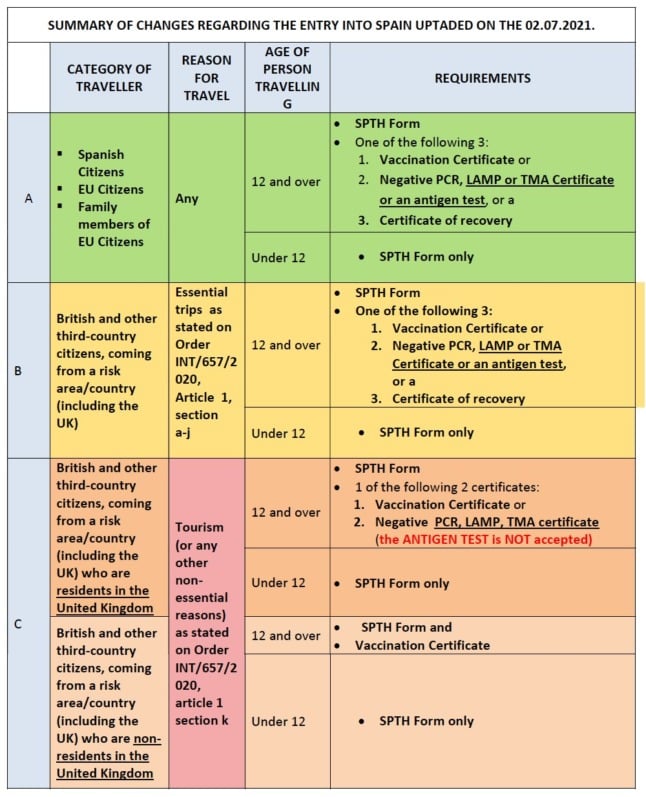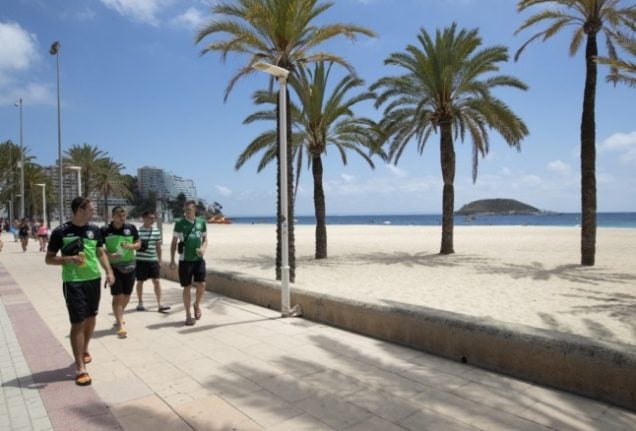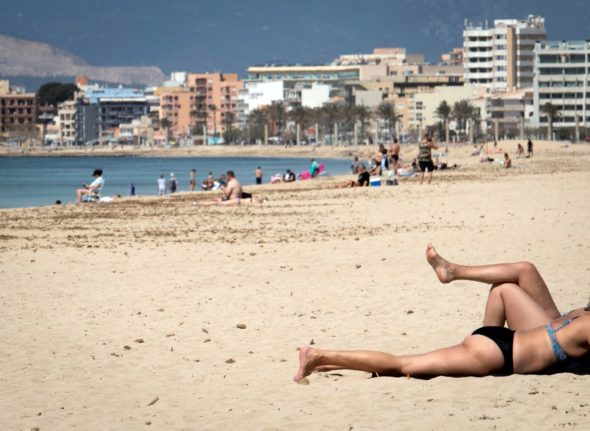What are the new entry requirements for Spain from the UK?
Update: On July 8th, the British government announced a relaxation of its quarantine rules for fully vaccinated travellers from the UK from July 19th, meaning that they will no longer need to quarantine upon return home from amber list countries. More details below under ‘Rules on return to the UK’.
READ ALSO: Do Brits in Spain still have to quarantine on return to the UK?
On July 2nd, the rules for UK travellers heading to Spain changed, requiring them to show either a negative Covid-19 test or a vaccination certificate.
An update from the Spanish Embassy in London was released on July 5th adding that Spanish and EU travellers and their families, as well as British residents in Spain could now enter Spain with an antigen test instead of the negative PCR, LAMP or TMA tests.
However, for British and other third-country citizens coming from the UK who are residents in the UK, antigen tests are not accepted.

Throughout June, travellers from the UK were able to enter Spain without the need to present a negative test or vaccination certificate. The new changes were first announced by Prime Minister Pedro Sánchez on June 28th, with an official state bulletin published the following day confirming some more details.
The tightened restrictions come in light of the now dominant Delta variant in the UK and the rise in cases across Spain, all of which has spurred Spain’s government to act.
Sánchez’s announcement came just days after the UK government included the Balearic Islands on its “green” travel list, allowing returning British tourists to avoid the ten-day quarantine on return.
On July 14th the UK put the Mediterranean archipelago on the amber list again as a result of a spike in Covid cases in the region and across Spain.
READ ALSO: Has Spain acted in time to stem another Covid surge before tourists arrive?
What more do UK travellers need to know about requirements and documentation?
According to gov.uk, the Spanish government requires all arrivals to Spain from the UK (excluding children under the age of 12) to present on entry one of the following:
- a negative COVID-19 test taken within 48 hours prior to arrival (e.g. PCR, TMA, LAMP, NEAR).
- Spanish residents and citizens, as well EU travellers and their families are able to present a negative antigen test instead.
- proof of being fully vaccinated at least 14 days prior to arrival in Spain (date(s) of vaccination must be specified), with a vaccine authorised by the European Medicines Agency or by the World Health Organisation.
Documents can be in either English, Spanish, French or German and in paper or electronic format. All documents must specify the name and surname of the passenger.
Spain will accept vaccines that have been “authorised by the European Medicines Agency or those that have completed the process of emergency use by the World Health Organisation”.
As things stand, there are four EMA-approved vaccines: Pfizer, Moderna, AstraZeneca and Johnson & Johnson.
According to the World Health Organisation website, the vaccines listed for emergency use are currently the Chinese-developed Sinopharm and Sinovac inoculations.
In the case of vaccination certificates, they must include the following information:
- Name and surname of the vaccinated person.
- Date of vaccination, indicating the date of the last dose administered.
- Type of vaccine administered.
- Number of doses administered/complete vaccination treatment.
- Issuing country.
- Identification of the issuing body that provided the vaccination certificate.
According to the Spain Travel Health website, the diagnostic test document should include the date of sampling, identification and contact details of the centre performing the analysis, technique used and negative result, done within 48 hours prior to arrival in Spain.
This means that whichever test you do, it has to be done within 48 hours before travel and not 72 hours as it was previously with PCRs.
All overseas visitors including arrivals from the UK have to complete a health control form on the Spain travel health website – which can be found here – which will give them a document with a QR code that they can show at the airport in paper or digital format, or both.
It’s worth noting that Britons can’t use the EU-wide Digital Covid Certificate to travel to Spain, nor do they have the option of showing a certificate of recovery from Covid-19 as a means of proving their health status.
According to the UK government website, “If you live in England, Spain will accept the NHS app or your NHS letter to demonstrate your COVID-19 vaccination status” and the respective documents for Scotland or Wales.
“Your NHS appointment card from vaccination centres is not designed to be used as proof of vaccination and should not be used to demonstrate your vaccine status,” British authorities state.
READ ALSO: The most common problems with the Spain Travel Health app and some potential solutions
 Tourists at Barcelona’s Sagrada Familia. Photo: Josep Lago/AFP
Tourists at Barcelona’s Sagrada Familia. Photo: Josep Lago/AFP
Covid-19 rules and restrictions in Spain
Spain has seen its its fortnightly infection rate quintuple in the past three weeks up to 471 cases per 100,000 people on July 15th, leading several regions to bring back old restrictions such as the curfew and limits on social gatherings.
READ MORE: Spain’s fifth Covid wave – What are the new restrictions in each region in July?
Spain lifted its outdoor face mask rule on Saturday June 26th, meaning that UK holidaymakers can travel to Spain from then on don’t have to wear a mask outside in the summer heat.
However, there are still situations both indoors and outdoors where face masks are required in Spain, which are worth reviewing in more detail below as they can result in a €100 fine for those who fail to follow the rules.
EXPLAINED: Where and when do you still have to wear a face mask outdoors in Spain?
Spain’s regions and municipalities have the power to adapt national face mask legislation how they see fit, so in places such as Tenerife where there has been a rise in infections coinciding with the end of outdoors rule, masks are still required outside.
Many people in Spain are also choosing to keep their masks on despite being able to remove them now.
If you travel first to mainland Spain and then to either the Balearic Islands or the Canary Islands, you may be required to prove your Covid health status again.
READ MORE: Do I need a Covid test to travel to another region in Spain this summer?
In general, restrictions on closing times and allowed capacity for bars, cafés and restaurants have been eased across the country. Nightclubs have also been allowed to reopen in some places although with no dancing and tight controls.
READ ALSO: Spain’s fifth Covid wave – What are the new restrictions in each region in July?
Rules on return to the UK
On July 8th, UK Transport Secretary Grant Shapps announced that from July 19th, fully vaccinated Brits visiting amber list countries, such as Spain, would no longer have to quarantine on arrival back in the UK. However, this new rule change does not include Brits who live abroad and were not vaccinated in the UK.
READ MORE: Do Brits in Spain still have to quarantine on return to the UK?
Currently, upon your return to the UK, you must follow the amber list rules if you’ve spent time in any of Spain’s regions, including the Balearic Islands from Monday July 19th, as that is when Mallorca, Menorca, Ibiza and Formentera will be removed from the UK’s green list and put back on the amber list.
Right now, the UK government website states that if coming from an amber-list country, even if you’ve been vaccinated, you need to follow these rules before you enter England:
- take a COVID-19 test before flying back to the UK
- book and pay for day 2 and day 8 COVID-19 travel tests– to be taken after arrival in England
- complete a passenger locator form
On arrival in England you must:
- quarantine at home or in the place you are staying for 10 days
- take a COVID-19 test on or before day 2 and on or after day 8
Children aged 4 and under do not need to take the day 2 or day 8 test.
You may be able to end quarantine early if you pay for a private COVID-19 test through the Test to Release scheme.
READ ALSO: Everything Brits need to know before travelling to Spain’s green-listed Balearic Islands
As for where you can get a Covid test in Spain, most of the country’s main airports and many labs and private health clinics in towns and cities offer antigen tests.
READ ALSO: Where can tourists in Spain get a PCR test and how much does it cost?
The prices vary considerably depending on the clinic or lab offering the antigen test and the region in which you are, from €75 in the more expensive private health centres in Madrid to €35 in Andalusia and the Canary Islands.
In terms of getting a PCR, prices in Spain can range from €90 to €180 so it’s worth googling “precio de prueba PCR” (price of PCR test) and then your location to find the best price at nearby clinics and labs.
READ MORE: What you should know before getting an antigen test for travel to and from Spain
Find further information on UK travel rules HERE.
Is there anything else I should know about booking flights to Spain soon?
There can be an important consequence to travelling to Spain’s amber-listed regions relating to insurance.
The UK government’s official travel page states that the Foreign, Commonwealth & Development Office position is “you should not travel to amber list countries” and this official advice will likely invalidate most travel insurance – despite what George Eustice said – so check your policy carefully.
Invalid travel insurance means you won’t be covered for things like cancellation costs but also, potentially more seriously, for health costs in case you become ill or have an accident while you are away.
The EHIC card, or its replacement GHIC, covers only some emergency medical care while travelling and there are many things that it does not cover, including repatriation costs if this is required. People who have travelled abroad against government advice could therefore be faced with a large bill for medical costs if they fall ill or have an accident while abroad.



 Please whitelist us to continue reading.
Please whitelist us to continue reading.
When you write these articles can you please include travel to Spain via road and specifically via France in particular for UK residents. Thanks